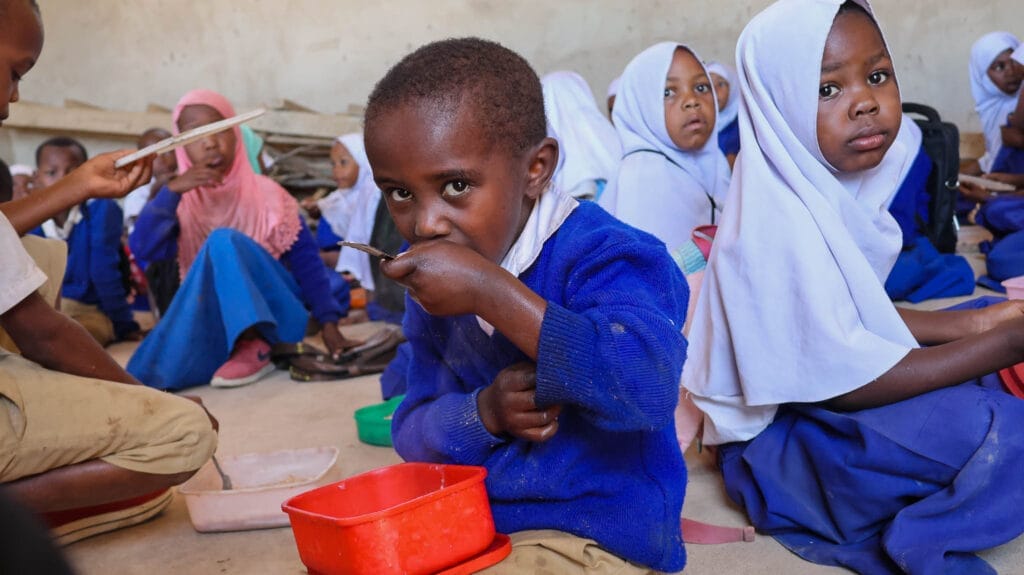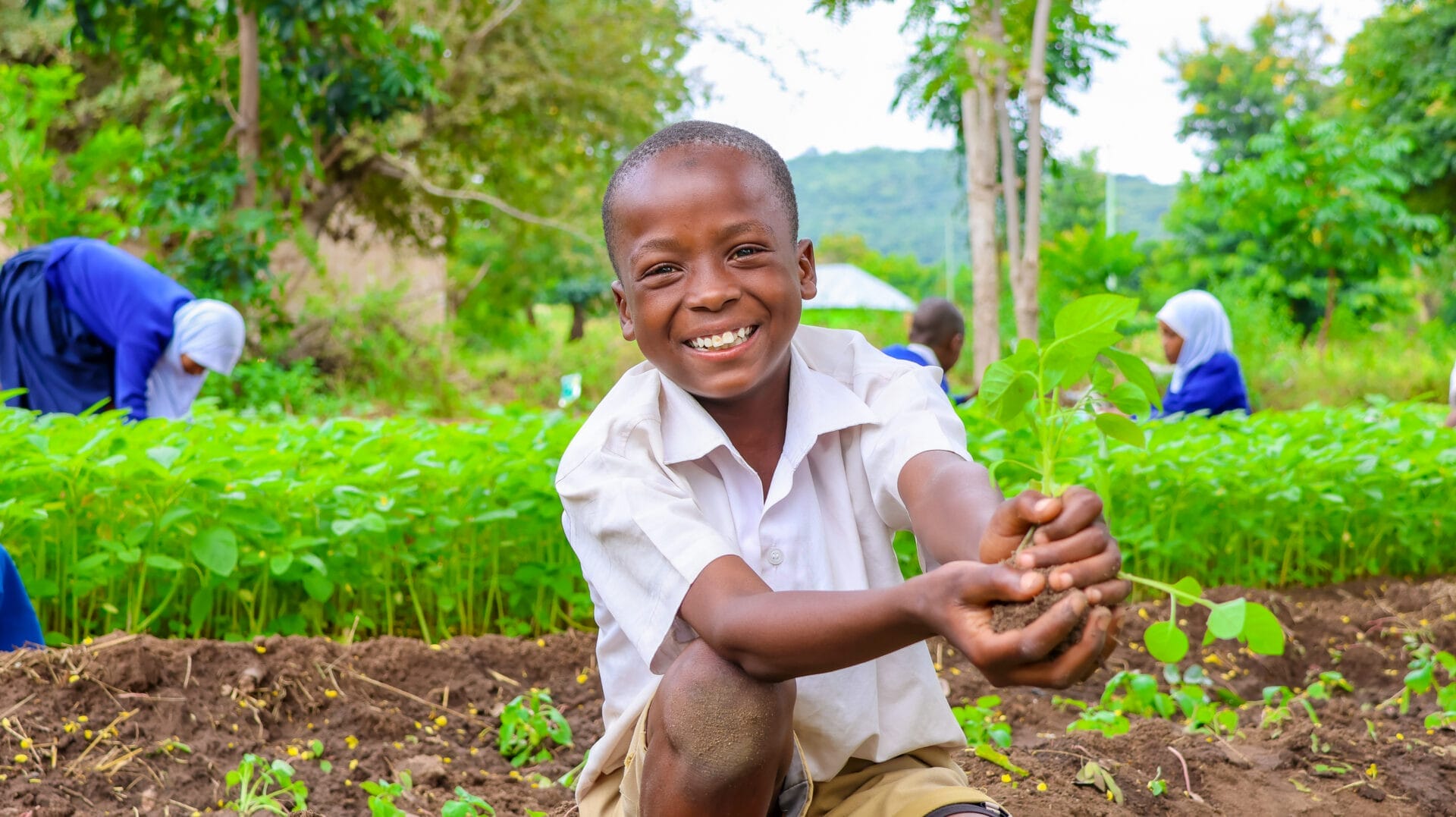The United Republic of Tanzania is one of Africa’s fastest-growing economies and is based heavily on agriculture, but with low agricultural productivity, almost half of its population lives below the poverty line. Since 2008, Global Communities has worked in Tanzania to improve health and nutrition, empower women as leaders and decision-makers, advance early childhood development and leverage technology innovations to create sustainable improvements in quality of life. Using community-focused approaches, we partner and collaborate with government, local communities and private sector partners to enable communities to empower themselves.
Given the country’s reliance on agriculture, Global Communities works with farmers to build capacity, utilize improved climate-smart techniques and increase their access to finance and markets. This boosts agricultural productivity, which in turn leads to increased incomes and more locally available nutritious foods.
We support farmers to partner with local schools to ensure students and families have access to nutritious foods through our school feeding programs, benefiting children, families farmers and the greater community. Tanzania’s wealth in natural resources and agricultural diversity present tremendous opportunities for livelihood improvement, family resilience and sustainability for future generations.
A highlight of our commitment to government partnership and transition to self-reliance is the recent development of the country’s first National School Feeding Guideline. Based on the success of our school feeding programs in the Mara Region, the Government of Tanzania requested our support to develop these guidelines. This represents a historical step in the country’s journey to achieving a National School Feeding Program that empowers quality and locally owned feeding programs nationwide.
Pamoja Tuwalishe: Improving Student Literacy & Health through School Feeding
In Tanzania, Global Communities is building on more than ten years of implementing integrated school feeding projects in close collaboration with the Government of Tanzania. With funding support from the United States Department of Agriculture (USDA), Global Communities leads the coordination of the program called Pamoja Tuwalishe meaning "Together Let's Feed Them" in Swahili.
Pamoja Tuwalishe supports 367 schools and communities to operationalize the country’s National School Feeding Guidelines. These program-supported schools are becoming centers of learning and excellence, serving as catalysts and models for the replication in additional schools. Through Pamoja Tuwalishe, schools, and districts increase the regularity and quality of meals served leading to increases in student attendance and attentiveness, which elevate overall education outcomes. Pamoja Tuwalishe’s integrated programming approach will contribute to improving the overall learning experience for more than 315,000 students in the program-supported schools over the life of the program. Pamoja Tuwalishe is focused on strengthening existing capacities, and systems, and enhancing collaboration between the local governments, schools and communities. The program reaches this goal through implementing three strategic lenses: transition, expansion and sustainability.
Innovating School Feeding through the Community School Feeding Model
Pamoja Tuwalishe supports 367 schools and communities to operationalize the country’s National School Feeding Guidelines. Under this program, Global Communities is utilizing the Community-led School Feeding model to enable schools, parents, communities, and local governments to develop customized approaches for their schools. Due to the flexible nature of this model, it creates community buy-in and ownership which increases parent engagement. The Community-led School Feeding model allows parents and community leaders to develop operational plans, contribute resources, monitor progress, and sustain school feeding activities.
The Community-led School Feeding model is comprised of four segments: the Operations Manual; the Toolkit; the training curriculum and the Digital Information and Learning System.
School Gardens: Life Flourishes in the Garden
Pamoja Tuwalishe’s School Garden Model trains and equips schools to nurture nutritious gardens that are learning sites for students to practice climate-smart agricultural practices while contributing healthy harvests for the students’ meals at school. This innovative model enables teachers, student garden clubs and parents to plan, cultivate, nurture and reap the harvests from nutritious-dense gardens that can be replicated at home.
Integrated Fleet Management System
In July of 2023, Global Communities created the Integrated Fleet Management System (IFMS) to optimize vehicle performance by improving passenger safety, reducing running costs, and lengthening vehicle life spans. The IFMS is a comprehensive collection of systems, tools, and procedures that guide fleet teams, the management of in-house repairs and maintenance, the execution of cashless refueling, the deployment of a GPC location tracking system and the utilization of a digital real-time data management system. The IFMS reduces fleet costs, enabling more resources to be contributed to the program activities at schools.
240,000+
students reached with school meals through our McGovern-Dole International Food for Education and Child Nutrition projects
100 million+
nutritious meals served to primary school students in Tanzania through our McGovern-Dole International Food for Education and Child Nutrition projects
231
schools with new or rehabilitated latrines or kitchens through our McGovern-Dole International Food for Education and Child Nutrition projects
231
libraries established, including mobile libraries and reading corners, through our McGovern-Dole International Food for Education and Child Nutrition projects
Recent Programs
Building Capacity for Sustainable, Locally Led School Feeding
From 2017-2021, the U.S. Department of Agriculture funded Global Communities to implement a Local and Regional Food Aid Procurement program called Chakula Chetu ("Our Food” in Swahili). This program complemented our McGovern-Dole program in Tanzania and built the capacity of 16 schools in Mara Region’s Butiama District to procure locally purchased foods for school meals. We also fostered a network of stakeholders (government leadership, market actors, schools, parents, farmers and communities) to build sustainable capacity for a complete transition to locally led school feeding. Throughout the program, Global Communities built or rehabilitated 16 school kitchens and provided over 2.7 million meals to ensure more than 14,000 students were provided with nutritious food to help them focus at school. (closed in 2021)
Increasing Access to Finance and Bolstering Trade for Small- and Medium-Sized Agribusinesses
From 2015-2020, Global Communities implemented the Agribusiness Investment for Market Stimulation (AIMS) program to bolster trade in key agricultural sectors in Kenya, Tanzania and Malawi by increasing access to financing, markets and capacity building for small- and medium-sized agribusinesses, including cooperatives and farmer-based organizations. AIMS was funded by the U.S. Department of Agriculture and included a $50 million loan guarantee facility backed by the Overseas Private Investment Corporation (OPIC). As a result of a cross-border Business to Business forum, which brings buyers and sellers together, agribusinesses in Malawi and Tanzania reached trade deals valued at $280 million per year, which are automatically renewable if service level is satisfactory. Participants included 45 agribusinesses from different levels of the grains value chain and service providers such as banks, insurance providers, policymakers and transporters. (closed in 2020)
Enabling Student Success through Healthy Meals & Improved Learning Environments
Since 2010, Global Communities (formerly PCI) has partnered with the U.S. Department of Agriculture's McGovern-Dole International Food for Education and Child Nutrition Program to increase attendance, improve literacy outcomes and enhance health and dietary practices for students in primary schools. From 2016-2021, Global Communities implemented the third phase of its McGovern-Dole project, called FFE III. This student-focused integrated school feeding project enhanced primary school learning outcomes and created sustainable community engagement through activities including the promotion of reading through libraries, reading clubs and talking walls; daily provision of nutritious school meals; climate-smart agriculture in school gardens and farms; health, hygiene and nutrition campaigns; and water, sanitation and hygiene interventions. The project served almost 35 million meals to over 225,000 students at 231 schools. We built or rehabilitated 52 latrines, 54 water systems and 75 kitchens, and contributed to the development of the National School Feeding Guideline, the Mara Regional School Feeding Strategy, and the National School Health Program Guide and Manual, which will soon be rolled out at the national and regional levels. (closed in 2021)
Engaging Fathers for Effective Child Nutrition and Development in Tanzania
In Tanzania’s Mara Region, undernutrition and inadequate stimulation are significant risk factors for poor early child growth and development outcomes. To address these needs, Global Communities (formerly PCI) and research partners — Harvard University, Purdue University and the Africa Academy of Public Health — developed an integrated nutrition and parenting implementation research study called Engaging Fathers for Effective Child Nutrition and Development in Tanzania (EFFECTS) to measure the effectiveness on child nutrition and development outcomes of bundled behavior change messages and activities that strengthen the capacity of mothers and fathers in providing optimal care for young children, including nutrition, responsive care, stimulation, and clean and safe home environments. This study, funded by the Eleanor Crook Foundation and Conrad N. Hilton Foundation, includes comprehensive and innovative metrics to track processes and document pathways from inputs to outcomes to understand best practices and key ingredients for effective male engagement and integration of nutrition and parenting interventions. This study concluded in February 2021 and results will be shared later this year.
Our Work in Tanzania
Climate Action
Meeting the Challenge of Climate Change
Expanding Economic Opportunity
Supporting Small and Medium-Sized Businesses and Community Savings and Lending Groups
Gender Equality & Social Inclusion
Lifting Marginalized Voices and Investing in Women as Leaders and Men as Allies
Health
Combating Disease, Improving Nutrition, and Ensuring Healthy Mothers, Children and Adolescents
Economic Opportunity
Advancing Job Training and Market Linkages for Sustainable Livelihoods
Resilience
Enhancing Food Security, Sustainable Agriculture and Water Management in Climate-Affected Communities
Sustainable Development
Standing with Communities as They Shape Their Own Future
Resources
Briefs & Case Studies
The School Garden Model
Pamoja Tuwalishe’s School Garden Model operationalizes the NSFG and will be utilized in the 367 program-supported schools. This Model will be used to train and equip schools to nurture nutritious school gardens that will serve as learning sites for students to practice climate-smart agricultural practices while contributing healthy harvests for the students’ meals at school.…
Briefs & Case Studies
Integrated Fleet Management System
Global Communities (GC) created and is utilizing an Integrated Fleet Management System (IFMS)which optimizes fleet performance by focusing on improving users’ experience while maximizingcost- effectiveness. Empowering and equipping the Fleet Team to achieve excellence, the IFMS is acomprehensive collection of systems, tools, and procedures that guide the supervision of the fleetteam, the management of in-house…
Briefs & Case Studies
The Community-led School Feeding Model
Pamoja Tuwalishe is an innovative school meals program t h a t i s supporting 367 schoolsand communities t o operationalize the National School Feeding Guidelines (NSFG). Implementedin support of the Government of Tanzania’s priority to improve learning outcomes andchildhood nutrition, the Pamoja Tuwalishe program is funded by USDA McGovern-Dole, andis implemented Global Communities in…
Capacity Materials
Advancing Maternal, Newborn and Child Health and Nutrition (MNCHN)
Global Communities has worked to save mothers’ and children’s lives and improve their health and well-being since 1961. We implement integrated maternal, newborn, child health and nutrition (MNCHN) programs at the individual, family, community and institutional levels. On the supply side, we partner with governments, civil society, and frontline health workers to strengthen health systems,…
NEWS
Latest stories from the blog

Igniting Children’s Potential, One Bite at a Time: Reflections from the International Food Aid Showcase
By Paula Rudnicka, Sr. Manager for Public Affairs Last month, Global Communities participated in the 2024 International Food Aid Showcase at the United States Department …
Read More
School Feeding Interventions as a Tool for Addressing Child Malnutrition: Experiences from Tanzania, Guatemala and Madagascar
By Betty Adera and Chloe Pan Malnutrition remains a pressing global issue, affecting millions of children and impeding their growth, development and well-being. It manifests …
Read More

